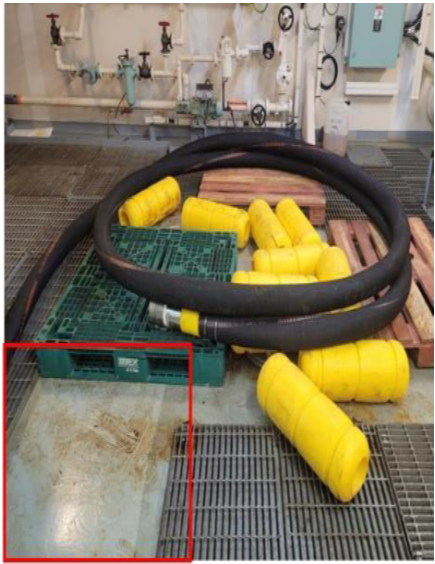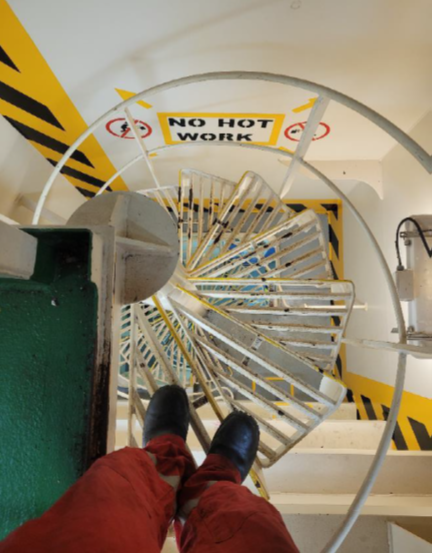Serious LTI – Crew member slipped on deck breaking his leg
What happened
Three engineering crew members were involved in the manual handling of a bunker hose from an upper storage area to a lower deck storage area accessed via a spiral staircase. One of the engineers slipped on a greasy area of the deck breaking his right leg (fibula or calf bone) in the fall.
The spiral ladder did not allow evacuation by stretcher. Fortunately, however, the injured person was conscious and was able to assist the rescue team and go up the stairs. Our member noted that a later drill highlighted that in the case of an unconscious casualty, the safest rescue route would have been to unbolt a vertical hatch leading to the bottom carousel area, which would have proved to have been time consuming.


What went wrong
- The area where the engineer slipped was an isolated spot that did not have any grating installed on the deck. It was also contaminated with grease and water from a previous task;
- The engineers were interrupted in their task by the requirement to conduct another task elsewhere;
- The bunker hose was routed vertically. As a result, residual water from within the hose was able to escape and pool on the deck below where crew accessed the storage area;
- The presence of grating nearly everywhere gives a false perception of a non-slippery surface;
- A Manual Handling Assessment was not considered for the task.
Learnings
- If available, place caps on end of hoses to eliminate water spillage;
- Ensure non-slip deck coating is applied in all exposed areas in storage rooms, and assess all other work and storage areas and apply same coating where required;
- Develop a manual handling assessment for the movement of bunkering hoses, incorporating the use of mechanical lifting aids wherever possible.
- Rescue equipment available onboard for an unconscious casualty – a stretcher – was not suitable for a rescue through the spiral ladders;
- Identify all areas onboard the vessel presenting difficult rescue (with limited access/egress) and consider additional rescue drills in all identified areas complete with designated rescues plans.
Members may wish to refer to:
- Slip on wet surface (Marine Safety Forum)
- Lost time injury – person slipped on the stairs and broke his arm
- Hose management and chemicals: crew person felt ill [hose had not been properly flushed afterwards and some of the previous liquid had remained in the hose]
Safety Event
Published: 27 March 2023
Download: IMCA SF 08/23
IMCA Safety Flashes
Submit a Report
IMCA Safety Flashes summarise key safety matters and incidents, allowing lessons to be more easily learnt for the benefit of all. The effectiveness of the IMCA Safety Flash system depends on Members sharing information and so avoiding repeat incidents. Please consider adding [email protected] to your internal distribution list for safety alerts or manually submitting information on incidents you consider may be relevant. All information is anonymised or sanitised, as appropriate.
IMCA’s store terms and conditions (https://www.imca-int.com/legal-notices/terms/) apply to all downloads from IMCA’s website, including this document.
IMCA makes every effort to ensure the accuracy and reliability of the data contained in the documents it publishes, but IMCA shall not be liable for any guidance and/or recommendation and/or statement herein contained. The information contained in this document does not fulfil or replace any individual’s or Member's legal, regulatory or other duties or obligations in respect of their operations. Individuals and Members remain solely responsible for the safe, lawful and proper conduct of their operations.
